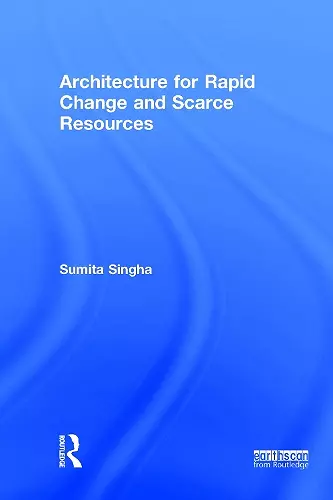Architecture for Rapid Change and Scarce Resources
Format:Hardback
Publisher:Taylor & Francis Ltd
Published:17th Feb '12
Currently unavailable, and unfortunately no date known when it will be back
This hardback is available in another edition too:
- Paperback£41.99(9781849711166)

Architects, development practitioners and designers are working in a global environment and issues such as environmental and cultural sustainability matter more than ever. Past interactions and interventions between developed and developing countries have often been unequal and inappropriate. We now need to embrace fresh design practices based on respect for diversity and equality, participation and empowerment.
This book explores what it means for development activists to practise architecture on a global scale, and provides a blueprint for developing architectural practices based on reciprocal working methods. The content is based on real situations - through extended field research and contacts with architecture schools and architects, as well as participating NGOs. It demonstrates that the ability to produce appropriate and sustainable design is increasingly relevant, whether in the field of disaster relief, longer-term development or wider urban contexts, both in rich countries and poor countries.
This thought provoking book links the structured world of buildings and design with the chaotic world of fluidity and diversity, bringing community participation in design into the centre of any planning process, even at a time of rapid change and resource scarcity. Reconciling the need for swift action with participatory processes is a challenge but as Sinha shows, this brings about the most sustainable solution and creates the most value. The book provides practical tips and advice and provides a good overview for students of architecture, those engaged in urban planning, as well as the development activist.Nicole Kenton, International Institute for Environment and Development
This book identifies the need for cultural sensitivity in design and architecture, as well as wider development practice, as a result of the challenges of operating in an increasingly global environment. In an in-depth exploration of culture and perception, Sinha rightly acknowledges that respect and professionalism are central to effective working practice as development practitioners. This book helps readers to understand the challenges of operating in a different cultural context and through poignant recommendations asks us to examine our own preconceptions of ourselves and of others. Article 25
At a time when modern architecture in the west has long since lost its social purpose and become the brand style of corporate capitalism, a now diminishing brand, this timely book offers a new prospect of an enlightened architectural future.Professor Mike McEvoy, University of Brighton
This will hopefully be a wake up call for the architectural profession, and its education system, to re-establish its fundamental political, social and environmental responsibilities.More important perhaps, and more difficult, is the book's emphasis on the need to ask questions and create connections, to gain a deeper understanding of the inseparability of all life on this extraordinary planet. You may not agree with every sentence in the book but you must read it and at the very least begin to acknowledge some of the critical issues it raises about the future of human society. Roger Kelly, former Director of the Centre for Alternate Technology.
ISBN: 9781849711159
Dimensions: unknown
Weight: 900g
320 pages